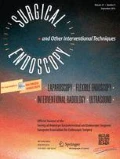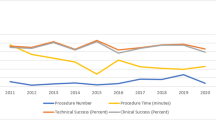Abstract
Background
General surgeons commonly perform upper gastrointestinal endoscopy in practice, but few perform endoscopic retrograde cholangiopancreatography (ERCP), partly because of limited training opportunities. This report focuses on the value of an ERCP fellowship training program to a broad-based, mature residency in surgery and our observations on the experience required for surgeons to be trained in advanced interventional ERCP.
Methods
Since the program was initiated in 1992, 13 ERCP fellows have been trained for individual periods of 6 to 14 months. This study investigated all procedures with fellow involvement (2,008 cases) from among a total experience of 3,641 ERCPs. Data collected included type of ERCP (diagnostic/therapeutic), fellow success in cannulating the duct of interest, and faculty success in cases of fellows who failed. Of the 13 fellows, 9 had previous endoscopy experience, but none had training in ERCP.
Results
An 85% cannulation rate was accepted as successful, and cannulation rates for each fellow were calculated for each 3-month period. The 85% mark was reached by 4 (31%) of 13 fellows in the first period, 2 of 13 fellows (15%) in the second period, 5 of 11 fellows (45%) in the third period, 7 of 10 fellows (70%) in the fourth period, and 1 of 1 fellow (100%) in the fifth period of training. On the average, it took 7.1 months and 102 ERCPs for trainees to reach desired success levels. Success came more promptly with prior exposure to endoscopy. Fellows without prior endoscopic experience required 148 cases to reach 85% success. Resident surgical experience with major pancreatic resections increased threefold after establishment of the fellowship.
Conclusions
Training in ERCP is possible within the scope of a surgical fellowship in a reasonable length of time and experience. Complication rates remain low even with fellow involvement. Establishment of an ERCP program increases the focus and experience of pancreas surgery in a surgical residency for chief residents.
Similar content being viewed by others
References
American Society for Gastrointestinal Endoscopy (2005) Methods of granting hospital privileges to perform gastrointestinal endoscopy. Retrieved October 24, 2005 at http://www.asge.org//pages/practice/Management/methodsofgranting.cfm?CFID=27519 & CFTOKEN = 42132197.
Coakley FV, Qayyum A (2002) Magnetic resonance cholangiopancreatography. Gastrointest Endosc 55: S2–S12
Jowell PS, Baillie J, Branch MS, Affronti J, Browning CL, Bute PB (1996) Quantitative assessment of procedural competence: a prospective study of training in endoscopic retrograde cholangiopancreatography. Ann Intern Med 125: 983–989
Larson GM, Mullins RJ, Wieman TJ, Polk HC Jr (1988) Evaluation of endoscopy training in a general surgery residency. Am Surg 54: 64–67
Lecesne R, Drouillard J, Taourel P, Rauturier JF, Bruel JM, Laurent F (1997) Techniques of MRI cholangiopancreatography: history, current status, and future prospects (in French). J Radiol 78: 623–627
Leung JW, Chung RS (1992) Training in ERCP. Gastrointest Endosc 38: 517–518
Marks G (1989) The surgeon as endoscopist. Surg Clin North Am 69: 1123–1127
Marks JM, Nussbaum MS, Pritts TA, Scheeres DE (2001) Evaluation of endoscopic and laparoscopic training practices in surgical residency programs. Surg Endosc 15: 1011–1015
Masci E, Toti G, Mariani A, Curioni S, Lomazzi A, Dinelli M, Minoli G, Crosta C, Comin U, Fertitta A, Prada A, Passoni GR, Testoni PA (2001) Complications of diagnostic and therapeutic ERCP: a prospective multicenter study. Am J Gastroenterol 96: 417–423
Meguid A, Scheeres DE, Mellinger JD (1998) Endoscopic retrograde cholangiopancreatography in a general surgery training program. Am Surg 64: 622–625
Mellinger JD, Ponsky JL (1994) Surgical endoscopy fellowships: what difference do they make? Surg Endosc 8: 86–89
Pontone P, Bogliolo G, Pietropaolo V, Poschmann AH (1998) Current status of the use of the endoscopic cholangiography technique (Italian). G Chir 19: 115–116
SAGES (1994) Framework for post-residency surgical education and training: a SAGES guideline. Surg Endosc 8: 1137–1142
SAGES (2003) Guidelines for training in diagnostic and therapeutic endoscopic retrograde cholangiopancreatography (ERCP). Retrieved October 24, 2005 at http://www.sages.org/sagespublication.php?doc=16
Satava RM (1989) Establishing an endoscopy unit for surgical training. Surg Clin North Am 69: 1129–1145
Schutz SM, Abbott RM (2000) Grading ERCPs by degree of difficulty: a new concept to produce more meaningful outcome data. Gatrointest Endosc 52: 704–705
Vitale GC, Zavaleta CM. Endoscopic retrograde cholangiopancreatography for surgeons. Semin Laparosc Surg 2003. 10: 19–27
Watkins JL, Etzkorn KP, Wiley TE, DeGuzman L, Harig JM (1996) Assessment of technical competence during ERCP training. Gastrointest Endosc 44: 411–415
Author information
Authors and Affiliations
Corresponding author
Rights and permissions
About this article
Cite this article
Vitale, G.C., Zavaleta, C.M., Vitale, D.S. et al. Training surgeons in endoscopic retrograde cholangiopancreatography. Surg Endosc 20, 149–152 (2006). https://doi.org/10.1007/s00464-005-0308-1
Received:
Accepted:
Published:
Issue Date:
DOI: https://doi.org/10.1007/s00464-005-0308-1



